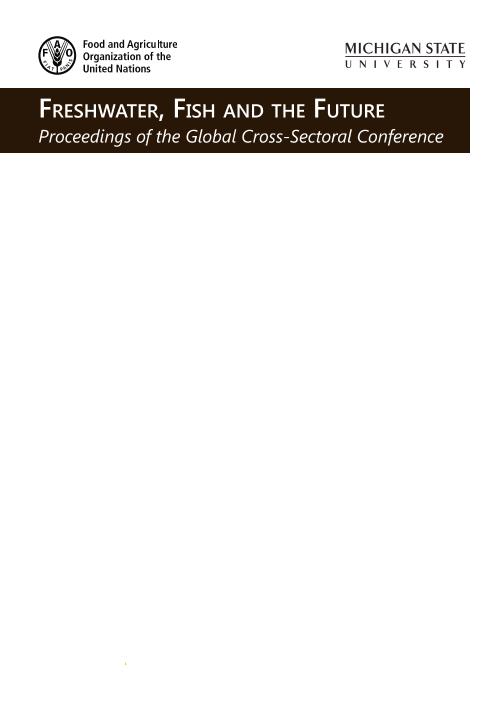Mostrar el registro sencillo del ítem
dc.contributor.author
Baigún, Claudio Rafael M.

dc.contributor.author
Castillo, Trilce Irupé

dc.contributor.author
Minotti, Priscilla Gail

dc.contributor.other
Taylor, William
dc.contributor.other
Bartley, Devin
dc.contributor.other
Leonard, Nancy
dc.contributor.other
Goddard, Christ
dc.date.available
2020-09-25T15:21:56Z
dc.date.issued
2016
dc.identifier.citation
Baigún, Claudio Rafael M.; Castillo, Trilce Irupé; Minotti, Priscilla Gail; Fisheries governance in the 21 st century: barriers and opportunities in South American large rivers; Food and Agriculture Organization; 2016; 301-309
dc.identifier.isbn
978-92-5-109263-7
dc.identifier.uri
http://hdl.handle.net/11336/114861
dc.description.abstract
South American large-river fisheries are experiencing a growing pressure due to mining activity, construction of dams, water diversion, dredging, commercial overfishing, pollution, floodplain deterioration, agriculture, and development. Despite the fact that artisanal fisheries represent a valuable resource for many riverine communities and play a critical role in assuring food security and poverty alleviation, managers are challenged to develop sound governance processes that ensure the sustainability of resources and fishing communities. The lack of effective governanceprocesses in artisanal fluvial fisheries is rooted in several social, economic, institutional, and ecological/environmental constraints. Most large-river fisheries are managed under a conventional approach, applying centralized government control policies that minimize stakeholders? participation in management decision making. River-fisheries governance is dependent on institutions, policies, and economic and political scenarios that are outside the fishery sector. Market demands and constructionof dams and river fragmentation, mining, pollution, cattle agriculture, deforestation, and recreational fishing pressure are all factors that have the potential to alter fisheries sustainability. Governance mechanisms in South American large rivers can be developed at three levels but need to prioritize economic growth, food security, employment, equitable access to resources, and poverty alleviation and promote and integrate the sustainable use of fluvial resources through stakeholders´ involvement in decision-making processes. To achieve such goals, new institutional and legal arrangements should be promoted envisioning small-scale fisheries as ecosystem services and implementing an ecosystem-based approach that integrates ecological and human components to support better governance processes.
dc.format
application/pdf
dc.language.iso
eng
dc.publisher
Food and Agriculture Organization
dc.rights
info:eu-repo/semantics/openAccess
dc.rights.uri
https://creativecommons.org/licenses/by-nc-sa/2.5/ar/
dc.subject
Small scale fisheries
dc.subject
Governance
dc.subject
South American large-river
dc.subject.classification
Otras Ciencias Naturales y Exactas

dc.subject.classification
Otras Ciencias Naturales y Exactas

dc.subject.classification
CIENCIAS NATURALES Y EXACTAS

dc.title
Fisheries governance in the 21 st century: barriers and opportunities in South American large rivers
dc.type
info:eu-repo/semantics/publishedVersion
dc.type
info:eu-repo/semantics/bookPart
dc.type
info:ar-repo/semantics/parte de libro
dc.date.updated
2020-08-05T16:55:53Z
dc.journal.pagination
301-309
dc.journal.pais
Italia

dc.journal.ciudad
Roma
dc.description.fil
Fil: Baigún, Claudio Rafael M.. Universidad Nacional de San Martín. Instituto de Investigación e Ingeniería Ambiental. Laboratorio de Ecología, Teledetección y Ecoinformática; Argentina. Consejo Nacional de Investigaciones Científicas y Técnicas; Argentina
dc.description.fil
Fil: Castillo, Trilce Irupé. Consejo Nacional de Investigaciones Científicas y Técnicas. Centro Científico Tecnológico Conicet - Rosario. Investigaciones Socio-Históricas Regionales. Centro de Estudios Sociales Regionales - Nodo Cesor - Ishir; Argentina
dc.description.fil
Fil: Minotti, Priscilla Gail. Consejo Nacional de Investigaciones Científicas y Técnicas; Argentina. Universidad Nacional de San Martín. Instituto de Investigación e Ingeniería Ambiental. Laboratorio de Ecología, Teledetección y Ecoinformática; Argentina
dc.relation.alternativeid
info:eu-repo/semantics/altIdentifier/url/http://www.fao.org/3/a-i5711e.pdf
dc.relation.alternativeid
info:eu-repo/semantics/altIdentifier/url/http://www.fao.org/documents/card/en/c/f9d1e02c-3b53-4be8-9049-a03e6fd55640/
dc.conicet.paginas
351
dc.source.titulo
Freshwater, fish and the future: proceedings of the global cross-sectoral conference
Archivos asociados
